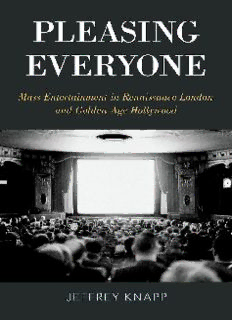
Pleasing everyone : mass entertainment in Renaissance London and golden-age Hollywood PDF
Preview Pleasing everyone : mass entertainment in Renaissance London and golden-age Hollywood
Pleasing Everyone Pleasing Everyone MASS ENTERTAINMENT IN RENAISSANCE LONDON AND GOLDEN-AGE HOLLYWOOD Jeffrey Knapp 1 1 Oxford University Press is a department of the University of Oxford. It furthers the University’s objective of excellence in research, scholarship, and education by publishing worldwide. Oxford is a registered trade mark of Oxford University Press in the UK and certain other countries. Published in the United States of America by Oxford University Press 198 Madison Avenue, New York, NY 10016, United States of America. © Jeffrey Knapp 2017 All rights reserved. No part of this publication may be reproduced, stored in a retrieval system, or transmitted, in any form or by any means, without the prior permission in writing of Oxford University Press, or as expressly permitted by law, by license, or under terms agreed with the appropriate reproduction rights organization. Inquiries concerning reproduction outside the scope of the above should be sent to the Rights Department, Oxford University Press, at the address above. You must not circulate this work in any other form and you must impose this same condition on any acquirer. Library of Congress Cataloging-in-Publication Data Names: Knapp, Jeffrey (Professor of English) author. Title: Pleasing everyone : mass entertainment in Renaissance London and golden-age Hollywood / Jeffrey Knapp. Description: New York : Oxford University Press, 2017. Identifiers: LCCN 2016027980| ISBN 9780190634063 (hardback) | ISBN 9780190634087 (epub) | ISBN 9780190634094 (online content) Subjects: LCSH: Theater—England—London—History—16th century. | Theater—England—London—History—17th century. | Theater and society—England—London—History—16th century. | Theater and society—England—London—History—17th century. | Motion pictures—United States—History—20th century. | Motion pictures—Social aspects—United States. | BISAC: ART / Film & Video. | PERFORMING ARTS / Film & Video / History & Criticism. | LITERARY CRITICISM / Shakespeare. Classification: LCC PN2596.L6 K647 2017 | DDC 792.09421/0903—dc23 LC record available at https://lccn.loc.gov/2016027980 1 3 5 7 9 8 6 4 2 Printed by Sheridan Books, Inc., United States of America To Dori and Maddie and James and Sam CONTENTS Acknowledgments ix Introduction 1 PART 1: The Individual and the Mass 1. Which Moll? 47 2. The Real John Doe 67 PART 2: Show Business 3. I Must Be Idle 95 4. One Step Ahead of My Shadow 112 PART 3: Junk and Art 5. Mocked with Art 147 6. Throw That Junk! 165 Epilogue: The Author of Mass Entertainment 197 Coda: A Second Look 228 Notes 235 Works Cited 269 Index 287 ACKNOWLEDGMENTS It’s wonderful to have this chance to thank the many friends and col- leagues who helped me write this book. At several stages throughout the process, Oliver Arnold, Victoria Kahn, and D. A. Miller boosted my spirits and gave me superb advice. I’m extremely grateful to them, as well to my colleagues at Representations and in the Early Modern Working Group at Berkeley; to my students, especially the brave souls who took my first graduate seminar on mass entertainment; and to Mark Goble, Stephen Greenblatt, Jesse Knapp, and Nancy Ruttenburg. I received expert assistance from the staff at the Margaret Herrick Library, the Wesleyan Cinema Archives, and the Cinematic Arts Library and Warner Bros. Archives of the University of Southern California. Jesse Cordes Selbin was a truly extraordinary research assistant; Wendy Xin and Aileen Liu were a great help with proofreading. My thanks to Brendan O’Neill for his faith in my project, and to Norman Hirschy for seeing me through; it was a pleasure to work with Stephen Bradley, Andrew Ward, and Amy Whitmer as well. My audiences at the University of Chicago, the CUNY Graduate Center, Caltech, Columbia, Yale, King’s College London, and Berkeley made an enormous differ- ence to my thinking about this book. And I’m deeply indebted to the University of California, Berkeley, for the research support I received first from a Chancellor’s Professorship and then from the Ida Mae and William J. Eggers, Jr. Chair in English. I would never have begun this book, let alone completed it, without the indefatigable encouragement and support of James Schamus and Samuel Otter. I dedicate the book to them, and to the two lights of my life: Dorothy Hale, always my first and best reader, and Madeline Hale, who just might read this one.
Description: